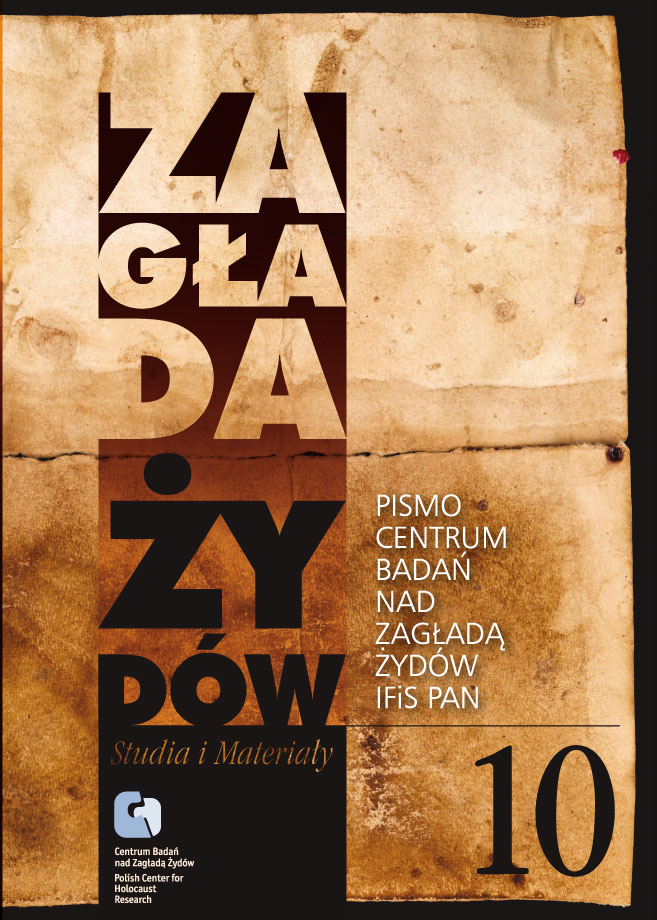Czy prawda nas wyzwoli? Przełamywanie oporu psychologicznego w przyjmowaniu wiedzy o Zagładzie
Zagłada Żydów. Studia i Materiały, Nr 10 (2014), Strony: 803-822
Data zgłoszenia: 2020-10-26Data publikacji: 2014-12-01
 https://doi.org/10.32927/ZZSiM.549
https://doi.org/10.32927/ZZSiM.549
Abstrakt
The introduction of the programs on Holocaust education in Poland and a broader debate on the transgressions of Poles against the Jews have not led to desired improvement in public knowledge on these historical events. A comparison of survey results from the last two decades (Bilewicz, Winiewski, Radzik, 2012) illustrates mounting ignorance: the number of Poles who acknowledge that the highest number of victims of the Nazi occupation period was Jewish systematically decreases, while the number of those who think that the highest number of victims of the wartime period was ethnically Polish, increases. Insights from the social psychological research allow to explain the psychological foundations of this resistance to acknowledge the facts about the Holocaust, and indicate the need for positive group identity as a crucial factor preventing people from recognizing such a threatening historical information. In this paper we will provide knowledge about the ways to overcome this resistance-through-denial. Implementation of such measures could allow people to accept responsibility for the misdeeds committed by their ancestors.
Słowa kluczowe
stosunki polsko-żydowskie , teoria tożsamości społecznej , opór psychologiczny
Licencja
Prawa autorskie (c) 2014 Autor&"Zagłada Żydów. Studia i Materiały"

Utwór dostępny jest na licencji Creative Commons Uznanie autorstwa 4.0 Międzynarodowe.
https://creativecommons.org/licenses/by/4.0
Czasopismo publikowane jest w standardzie Diamond Open Access na licencji CC-BY-4.0 Deed - Uznanie autorstwa 4.0 Międzynarodowa - Creative Commons
Inne teksty tego samego autora
- Michał Bilewicz, Nie tylko o „Strachu”. Psychologia potocznego rozumienia historii , Zagłada Żydów. Studia i Materiały: Nr 4 (2008)
- Michał Bilewicz, Karolina Marcinkowska, Społeczna psychologia Holokaustu: od naiwnego sytuacjonizmu do zrozumienia roli ideologii , Zagłada Żydów. Studia i Materiały: Nr 20 (2024)
Podobne artykuły
- Katharina Friedla, Angelika Benz, Handlanger der SS. Die Rolle der Trawniki-Männer im Holocaust , Zagłada Żydów. Studia i Materiały: Nr 12 (2016)
- Adam Kopciowski, Przemoc antyżydowska w powojennej Polsce w świetle ksiąg pamięci , Zagłada Żydów. Studia i Materiały: Nr 14 (2018)
- Alina Skibinska, „Ludzie opowiadali rzeczy potworne o tym, co się tam działo”. Dwa świadectwa Zagłady – Adama Ulricha z Zakrzówka i Stanisława Ż(Rz)emińskiego z Łukowa , Zagłada Żydów. Studia i Materiały: Nr 13 (2017)
- Anna Bikont, „W sprawie zamordowania rodziny mojej…”. , Zagłada Żydów. Studia i Materiały: Nr 19 (2023)
- Marta Duch-Dyngosz, W poszukiwaniu lokalnej pamięci o Zagładzie. Przypadek upamiętniania społeczności żydowskich w mniejszych miejscowościach we współczesnej Polsce , Zagłada Żydów. Studia i Materiały: Nr 17 (2021)
- Zuzanna Schnepf-Kołacz, In a Ciechania presbytery The story of saving Zofia Trembska. A case study , Zagłada Żydów. Studia i Materiały: 2010: Holocaust Studies and Materials
- Anthony Polonsky, Marian Turski in Memoriam , Zagłada Żydów. Studia i Materiały: Nr 21 (2025)
- Krzysztof Bielawski, „Nawet umarłym nie dali spokoju”. Destrukcja cmentarzy żydowskich na terenach obecnej Polski w latach 1933–1945 , Zagłada Żydów. Studia i Materiały: Nr 15 (2019)
- Paweł Dobrosielski, Obrońcy wiary. Węzłowe spory o polsko-żydowską przeszłość od 2015 roku , Zagłada Żydów. Studia i Materiały: Nr 18 (2022)
- Aleksandra Bańkowska, Polish Partisan Formations during 1942–1944 in Jewish Testimonies , Zagłada Żydów. Studia i Materiały: 2008: Holocaust Studies and Materials
<< < 1 2 3 4 5 6 7 8 9 10 11 12 13 14 15 16 17 18 19 20 21 22 23 24 25 26 27 28 > >>
Możesz również Rozpocznij zaawansowane wyszukiwanie podobieństw dla tego artykułu.
 English
English
 Język Polski
Język Polski



 https://orcid.org/0000-0001-5027-1691
https://orcid.org/0000-0001-5027-1691





